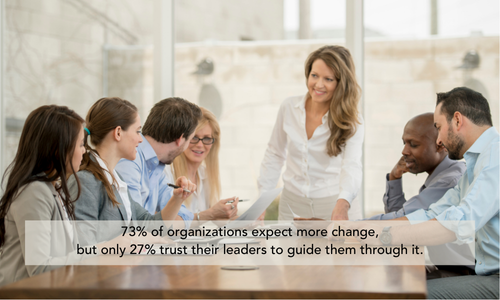In our previous article, we explored methods to regain personal control amidst rapid change. Now, it’s time to focus on equipping your team to navigate this accelerated pace.
As a leader, you may often find yourself needing to drive initiatives at a speed that challenges your team’s comfort zone. While advocating for a more manageable pace on certain projects is possible, the overarching sense of urgency in today’s business environment remains. Therefore, it’s crucial to adopt strategies that motivate and energize your team, enhancing both efficiency and effectiveness.
73% of organizations anticipate an increase in change initiatives . However, only 27% of employees believe their leadership is trained to guide teams through change. This gap underscores the need for leaders to adopt strategies that not only manage change but also empower their teams during transitions.
Strategies to Enhance Team Adaptability and Performance
- Enhance Communication Transparency: Clear, transparent communication is vital during times of change. Articulating the reasons behind changes and how they align with organizational objectives helps in gaining team buy-in and reducing uncertainty. Be sure to Regularly update your team on organizational developments and the rationale behind decisions while . Creating an open environment where team members feel comfortable voicing concerns and asking questions.
- Conduct Frequent, Short Meetings: Regular, concise meetings, such as 15-minute daily huddles, can enhance transparent and timely communication, address immediate concerns, set daily priorities, and foster a sense of connection and alignment without consuming excessive time. Use a structured agenda to keep discussions focused and productive.
- Leverage AI to Streamline Workflows: Artificial Intelligence (AI) can automate repetitive tasks like data entry, scheduling meetings and generating reports, freeing your team to focus on strategic initiatives. Work you’re your team to Identify routine tasks that can be automated, introduce AI tools designed for these functions and provide training to ensure seamless integration.
- Prioritize High-Impact Projects: Focusing on fewer projects with significant impact prevents team burnout and ensures resources are allocated effectively. This approach allows for deeper engagement and higher-quality outcomes. Collaborate with your team to identify and commit to initiatives that align with organizational goals and have the most substantial impact.
Leading a team through rapid change requires intentional strategies that promote efficiency, adaptability, and well-being. By integrating AI to automate tasks, conducting focused meetings, prioritizing impactful projects, fostering continuous learning, and maintaining transparent communication you can empower your team to navigate change confidently and effectively.
